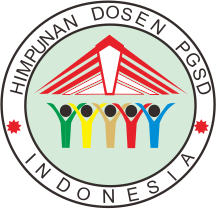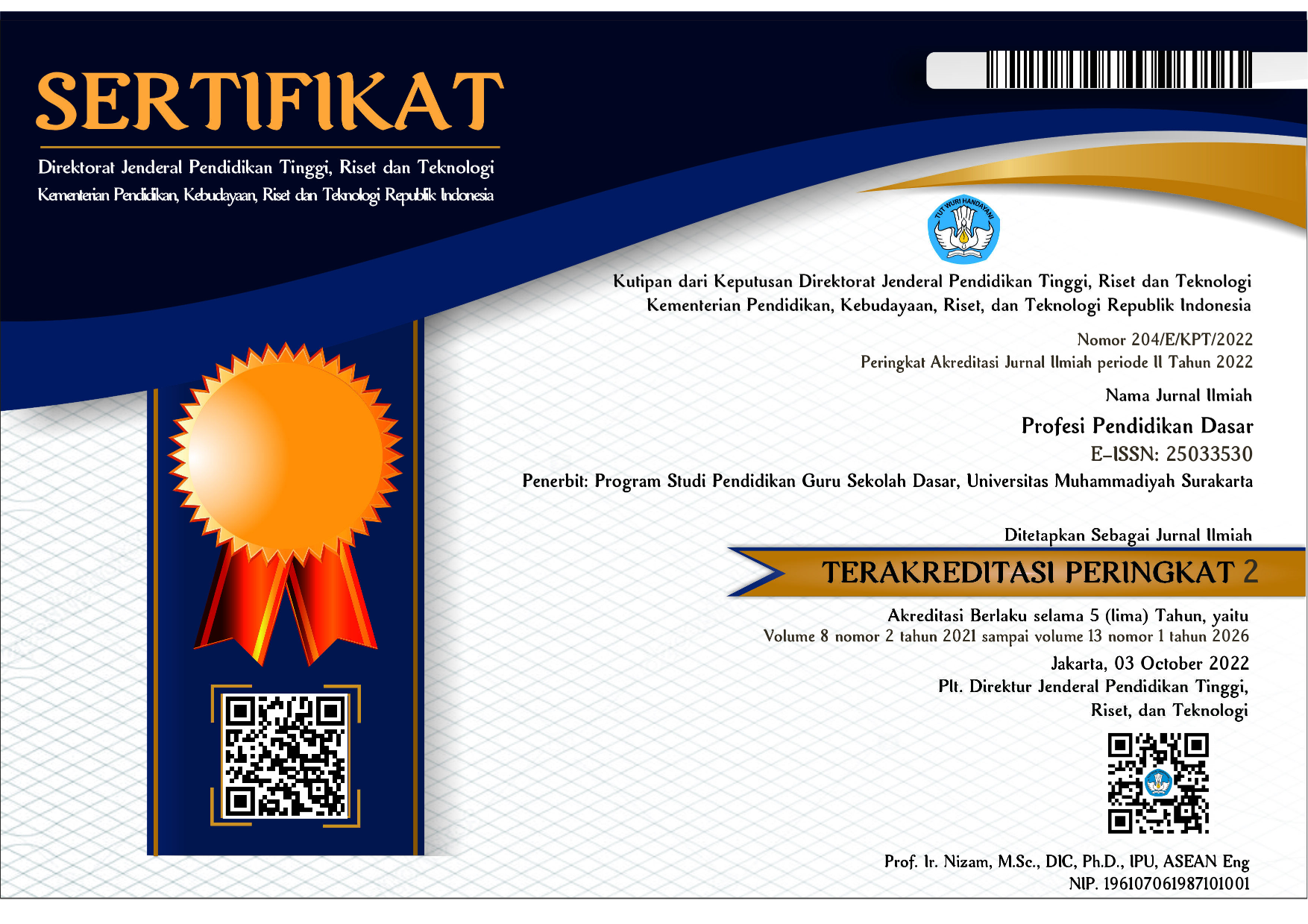Profesi Pendidikan Dasar is a peer-reviewed international journal. This statement clarifies the ethical conduct of all parties involved in the publication of an article in this journal, including the author, the chief editor, the Editorial Board, the peer reviewers, and the publisher (Universitas Muhammadiyah Surakarta), as well as allegations of research misconduct. This statement is based on the Best Practice Guidelines for Journal Editors published by COPE.
Ethical Guideline for Journal Publication
The publication of an article in a peer-reviewed journal is a critical building block in the formation of a coherent and respected knowledge network. It reflects the caliber of the authors' work as well as the institutions that support them. The scientific method is supported and embodied by peer-reviewed articles. As a result, it is critical to agree on ethical standards for all parties involved in the publishing process: the author, the journal editor, the peer reviewer, the publisher, and the society.
Universitas Muhammadiyah Surakarta, as publisher of Profesi Pendidikan Dasar, takes its guardianship duties over all stages of publishing very seriously, and we are aware of our ethical and other responsibilities. We are committed to ensuring that advertising, reprint, or other commercial revenue has no bearing on editorial decisions. In addition, the Department of Primary Education of Universitas Muhammadiyah Surakarta and the Editorial Board will assist in communications with other journals and/or publishers as needed..
Allegations of Research Misconduct
Research misconduct is defined as fabrication, falsification, citation manipulation, or plagiarism in the production, performance, or review of research and writing articles by authors, or in the reporting of research results. When authors are found to be involved in research misconduct or other serious irregularities involving articles published in scientific journals, editors have a responsibility to ensure the accuracy and integrity of the scientific record.
In cases of suspected misconduct, the Editors and Editorial Board will use COPE best practices to help them resolve the complaint and address the misconduct fairly. The Editors will investigate the allegation. A manuscript that is found to contain such misconduct will be rejected. If such misconduct is discovered in a published paper, a retraction can be published and linked to the original article.
The first step is to determine the validity of the allegation and whether it is consistent with the definition of research misconduct. This initial step also includes determining whether the individuals alleging misconduct have relevant conflicts of interest.
If scientific misconduct or other significant research irregularities are suspected, the allegations are shared with the corresponding author, who is asked to provide a detailed response on behalf of all coauthors. Following receipt and evaluation of the response, additional review and participation of experts (such as statistical reviewers) may be obtained. In cases where it is unlikely that misconduct occurred, clarifications, additional analyses, or both, published as letters to the editor, often with a correction notice and correction to the published article, are sufficient.
Institutions are expected to conduct an appropriate and thorough investigation into allegations of scientific misconduct. Finally, authors, journals, and institutions have a significant obligation to ensure the accuracy of the scientific record. Profesi Pendidikan Dasar will continue to fulfill its responsibilities of ensuring the validity and integrity of the scientific record by responding appropriately to concerns about scientific misconduct and taking necessary actions based on these concerns, such as corrections, retractions with replacement, and retractions..
Publication decisions
Profesi Pendidikan Dasar journal's editor is in charge of determining which of the articles submitted to the journal should be published. Such decisions must always be driven by the validation of the work in question and its value to academics and readers. The editors may be led by the editorial board's policies and bound by the legal requirements in effect at the time addressing libel, copyright infringement, and plagiarism. In reaching this judgment, the editors may consult with other editors or reviewers.
Complaints and Appeals
Profesi Pendidikan Dasar will have a clearly defined procedure for dealing with complaints about the journal, its Editorial Staff, Editorial Board, or its Publisher. Concerning the case of complaint, the complaints will be clarified to respected individuals. Complaints can be about anything related to the journal business process, such as the editorial process, discovered citation manipulation, unfair editor/reviewer, peer-review manipulation, and so on. The complaints will be handled in accordance with COPE guidelines. Cases of complaint should be sent via email to jurnalpgsd@ums.ac.id.
Fair play
An editor at any time evaluate manuscripts for their intellectual content without regard to race, gender, sexual orientation, religious belief, ethnic origin, citizenship, or political philosophy of the authors.
Confidentiality
The editor and any editorial staff are prohibited from disclosing any information about a submitted article to anybody other than the corresponding author, reviewers, potential reviewers, other editorial advisers, and the publisher, if applicable.
Disclosure and conflicts of interest
Unpublished materials disclosed in a submitted manuscript must not be used in an editor's own research without the express written consent of the author.
Duties of Reviewers
Editorial Decisions Contribution
Peer review aids the editor in making editorial decisions, and through editorial communications with the author, it may also aid the author in enhancing the paper.
Promptness
If a referee feels unqualified to evaluate the research described in a manuscript or knows that a prompt review is impossible, he or she must notify the editor and withdraw from the review process.
Confidentiality
Manuscripts submitted for evaluation must be treated as confidential documents. Except as authorized by the editor, they may not be shown to or discussed with others.
Objectiveness Standards
Reviews should be objectively conducted. It is inappropriate to criticize the author personally. Referees should articulate their positions with clarity and support.
Sources Acknowledgments
Reviewers are tasked with identifying relevant published works that have not been cited by the authors. Any statement that an observation, derivation, or argument has been previously reported should be accompanied by a citation. A reviewer should also bring to the editor's attention any substantial overlap or similarity between the manuscript under consideration and any other published paper of which they are aware.
Transparency and Conflict of Interest
Information or concepts obtained through peer review must be kept confidential and not used for personal gain. Reviewers should not consider manuscripts where they have competing, collaborative, or other relationships or connections with any of the authors, companies, or institutions associated with the papers.
Duties of Authors
Reporting Requirements
Authors of reports on original research must provide an accurate description of the work performed and an objective analysis of its significance. In the paper, underlying data should be accurately represented. A paper should include sufficient information and citations to allow others to replicate the work. False or intentionally inaccurate statements constitute unethical conduct and are therefore unacceptable.
Access, Retention, and Reproducibility of Data
Authors are requested to provide the raw data associated with a paper for editorial review, and should be prepared to provide public access to such data, if feasible, and should be prepared to retain such data for a reasonable period of time after publication. Authors are accountable for the reproducibility of data.
Originality and Plagiarism
The authors should ensure that their works are entirely original, and if they have used the work and/or words of others, that they have cited or quoted them appropriately.
Multiple, Redundant or Concurrent Publication
In general, an author should not submit manuscripts describing essentially the same research to multiple journals or primary publications. Submitting the same manuscript to multiple journals simultaneously is unethical and unacceptable publishing behavior.
Acknowledgement of Sources
Always give credit where credit is due; always acknowledge the work of others. Authors should cite influential works that have influenced the nature of the reported work.
Authorship and Contributorship of the Article
Authorship should be restricted to those who contributed significantly to the conception, design, execution, or interpretation of the reported study. As co-authors, all those who have made significant contributions should be listed.
Others should be acknowledged or listed as contributors when they have contributed to certain substantive aspects of the research project.
The corresponding author must ensure that all appropriate co-authors are listed on the paper, that no inappropriate co-authors are listed, and that all co-authors have seen and approved the final version of the paper and have agreed to its submission for publication.
Disclosure and Conflicts of Interest
All authors should disclose in their manuscript any financial or other material conflicts of interest that could be construed as having an impact on the results or interpretation of their manuscript. Disclosing all sources of financial support for the project is required.
Fundamental errors in published work
When an author discovers a significant error or inaccuracy in his or her own published work, it is the author's responsibility to notify the journal editor or publisher as soon as possible and to work with the editor to retract or correct the paper.
Ethical Oversight
If the research involves chemicals, humans, animals, procedures, or equipment with unusual dangers inherent in their use, the author must clearly identify them in the manuscript in order to comply with the ethical conduct of research involving human and animal subjects. If required, Authors must provide legal and ethical clearance from a legal association or organization.
If the research involves confidential data and business/marketing practices, the authors must justify whether the data or information will be securely concealed or not.
Intelectual Property (Copyright Policy)
Journal policy about intelectual property or copyright is declared here: https://journals.ums.ac.id/index.php/ppd/about/submissions#copyrightNotice
Peer-Review Process Policy
Peer-Review process/policy is declared here: https://journals.ums.ac.id/index.php/ppd/about/editorialPolicies#peerReviewProcess
Post-Publication Discussions and Corrections
Profesi Pendidikan Dasar welcomes reader comments and corrections on previously published articles. If a reader has comments and corrections on a piece that has already been published, the reader can email the editor-in-chief and express their thoughts. The discussions and corrections will be published in the following issue as a Letter to Editor if approved (by the Editor in Chief). Respected authors can respond to reader comments and edits by sending a message to the editor in chief. If applicable, the response may be published as a Response to a Letter to Editor.


















